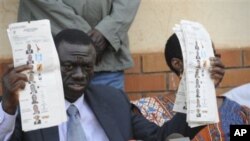Uganda’s electoral commission on Wednesday plans to begin publicly displaying its voters list to enable prospective voters to verify their information.
The compiled list will be used for next year’s general election, said Jotham Taremwa, spokesman for the electoral commission.
“We had a new update of the national voters register in which new people of voting age had to register. So we have now to publicly put it out for verification,” said Taremwa. “The exercise is meant to ensure that [they] are on it as a voter [and] whoever is not supposed to be on the register is identified and removed. So we will be doing this cleanup beginning the 22nd of July and close the exercise on the 11th of August this year.”
He said that for the first time, the electoral body would be using new biometric measures to prevent irregularities such as vote rigging during polling.
“Before, we didn’t register voters using the biometric system, [but] this time, in preparation for the 2016 general election, we registered every voter by scanning all the 10 fingerprints, by using digital signatures and also capturing their images. That means it is only one person who could register and that you could not do multiple registrations at different registration centers,” he said.
Critics say that in previous elections, the electoral commission compiled nontransparent voters lists, which they said undermined the credibility of elections.
Taremwa disagreed. He said the electoral commission worked closely with all political parties and civil society groups in the compilation of the voters list.
“All measures have been put in place to ensure there is transparency and to ensure there is full participation of every other voter in the cleanup of the voters register,” said Taremwa.
A prominent opposition leader said Ugandans would no longer tolerate rigged elections, after what he said had been years of voter irregularities and polls that were skewed in favor of President Yoweri Museveni and his ruling National Resistance Movement.
Kizza Besigye told VOA there is a need for electoral reforms to ensure an equal playing field for opponents of the NRM before elections are held.
Opposition leaders have proposed reforms that include dissolving the electoral commission, passing laws that strip the president of the power to name the members of the commission, and the compilation of an entirely new voters list.
Some members of parliament have called on the government to consider rescheduling the election until after the reforms are put in place.
Taremwa said some of the reforms demanded by the opposition groups were legitimate.
“Some of the reforms are genuine, some of them are not. I don’t think the solution lies in the disbandment of the commission. The solution lies on the vigilance. We have enough laws on our law books so that if everyone participated, it would be free and fair,” said Taremwa.





